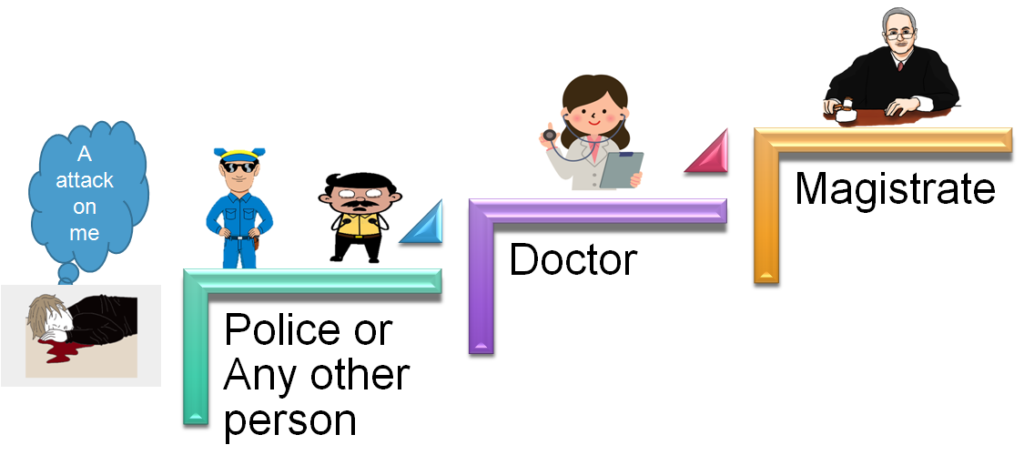Section – 32 (1) of Evidence Act
Evidentiary value of Dying Declaration

“A person who is about to die would not lie, as truth sits on the lips of a person who is about to die “
Dying declaration is based on the maxim “Nemo moriturus praesumitur mentire” It means a man will not meet his maker with a lie in his mouth. The statements made by a person as to the cause of his death or as to circumstances of the transaction resulting in his death is called a dying declaration.
Indian law recognizes the fact that ‘a dying man seldom lies.’ Or ‘truth sits upon the lips of a dying man.’
Section 32(1) of the Indian Evidence Act, 1872 explore the concept of dying declaration. Section 32 deals with the cases related to that person who is dead or who cannot be found.
A dying declaration is called as ” Leterm Mortem”. The word ” Leterm Mortem” means ” Words said before death”
A dying declaration is admissible in evidence even though it has not been made on oath and the person making it can-not be cross-examined. It is an exception to the rule of hearsay evidence
The dying declaration is undoubtedly admissible under section 32 and not being statement on oath so that its truth could be tested by cross-examination.
It is one of the substantive piece of evidence , and only on the basis of dying declaration , conviction can happen. But it is the rule of prudence to corroborate in cases where it is not made Magistrate.
Illustrative Image -1 -Shows that Dying Declaration can be to any body but highest reliability is given to Magistrate if he is able to record Dying Declaration.

Evidentiary value of Dying Declaration is important topic for Judicial Services Examination. JurisCrack provides free video lectures and note
In Khushal Rao v. State of Bombay, Supra, Hon’ble Apex Court laid down following principles:
- There is no absolute rule of law that a dying declaration cannot be the sole basis of conviction unless corroborated. A true and voluntary declaration needs no corroboration.
- A dying declaration is not a weaker kind of evidence than any other piece of evidence.
- Each case must be determined on its own facts keeping in view the circumstances in which the dying declaration was made.
- A dying declaration which has been recorded by a competent Magistrate in the proper manner, that is to say, in the form of questions and answers and as far as practicable in the words of the maker of the declaration, stands on a much higher footing than a dying declaration which depends upon oral testimony which may suffer from all the infirmities of human memory and human character.
- In order to test the reliability of a dying declaration the court has to keep in view the circumstances like the opportunity of the dying man for observation,
In State of UP v. Madan Mohan (AIR 1989 SC 1519), Hon’ble Apex Court Held that
- it is for the court to see that dying declaration inspires full confidence as the maker of the dying declaration is not available for cross-examination
- Court should satisfy that there was no possibility of tutoring or prompting.
- Certificate of the doctor should mention that victim was in a fit state of mind.
- Magistrate recording his own satisfaction about the fit mental condition of the declarant was not acceptable especially if the doctor was available.
- Dying declaration should be recorded by the executive magistrate and police officer to record the dying declaration only if condition of the deceased was so precarious that no other alternative was left.
- Dying declaration may be in the form of questions and answers and answers being written in the words of the person making the dying declaration. But court cannot be too technical.
In Pakala Narayana Swami vs Emperor ((1939) 41 BOMLR 428): The statement of Pakala Narayana Swamy’s wife, ”He is going to Berhampur to get back his amount” was considered as a dying declaration
In Paniben v State oof Gujarat (AIR 1992 SC 1817) Supreme court laid down certain guidelines while dealing with dying declaration.
- With all mentioned above about the evidentiary value of dying declaration it is held that
- Incase dying declaration is suspicious it should not be acted upon without corroboration.
- Dying declaration which surfers from infirmity cannot be the basis of conviction.
- Merely the dying declaration does not contain details, is short, is not be discarded
- Where there are more than one version of dying declaration, the first in point of time be preferred.
Exceptions –
- If the cause of death of the deceased is not in question
- If the declarer is not a competent witness:
- Inconsistent declaration
- Doubtful features
- Influenced declaration
- Incomplete declaration
- Unsound person
- If statement relates to death of another person
The Supreme Court observed that the dying declaration of wife under Section 32(1) of the Indian Evidence Act can be used against husband to prove cruelty under Section 498A of the Indian Penal Code (IPC) even if he is acquitted of charges related to her death [Surendran v. State of Kerala].
A three-Judge Bench of Chief Justice of India NV Ramana, Justices AS Bopannaand Hima Kohli, however, noted that the same is subject to two pre-conditions:
- Wife’s cause of death must come into question in the matter;
- The prosecution will have to show that the evidence that is sought to be admitted with respect to Section 498A of the IPC must also relate to the circumstances of the transaction of the death








No comment